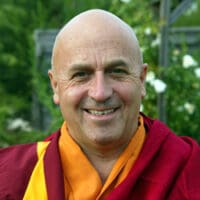Overview
A vast and selfless aspiration can be the source of the greatest human qualities and accomplishments; an egocentric aspiration offers no guarantee of genuine satisfaction. Desire is natural, and it plays an essential role in helping us to realize our aspirations. Yet, it is a blind force that is capable of either providing inspiration to our life or poisoning it. Desire degenerates into a “mental toxin” as soon as it becomes craving, obsession, or unmitigated attachment. Craving is all the more frustrating and alienating in that it is out of sync with reality. When desire becomes a pervasive craving, we become addicted to the very causes of suffering. Afflictive mental states also tend to distort our perception of reality, preventing us from seeing it as it really is. Craving idealizes its object; hatred demonizes it. This misapprehension opens a gap between the way things appear and they way they are. On the other hand, states of mind such as selfless love reflect some understanding of the intimate interdependence of beings and our happiness and that of others-a notion that is attuned to reality. Experience shows that craving gains in strength when repeatedly allowed to take its course, just as the more salt water one drinks, the thirstier one becomes. Once we reach a stage of mental and physical dependency, craving feels more like servitude than pleasure. We lose our freedom. It does not follow, however, that we need to stifle our emotions. Preventing them from being expressed while leaving them intact, like a time bomb in a dark corner of our mind, is an unhealthy solution. We need to establish the right dialogue between our intelligence and our emotions to prevent afflictive emotions from proliferating and invading our mental landscape. Buddhism teaches three principal ways of dealing with craving and other negative emotions. The first consists of applying a direct antidote to craving. The second allows us to free ourselves from craving by not identifying with it but instead looking straight at it and letting it dissolve in awareness as soon as it arises. The third uses the raw power of emotion as a catalyst for inner change. The choice of one method over another will depend on the moment, the circumstances, and the capacities of the individual. All share a common aspect and the same goal: to help us stop being victims of afflictive emotions.
- Dialogue 2711 sessions
- October 31, 2013Dharamsala, Himachal Pradesh, India


